高中英语语法知识点
- 格式:doc
- 大小:57.00 KB
- 文档页数:7
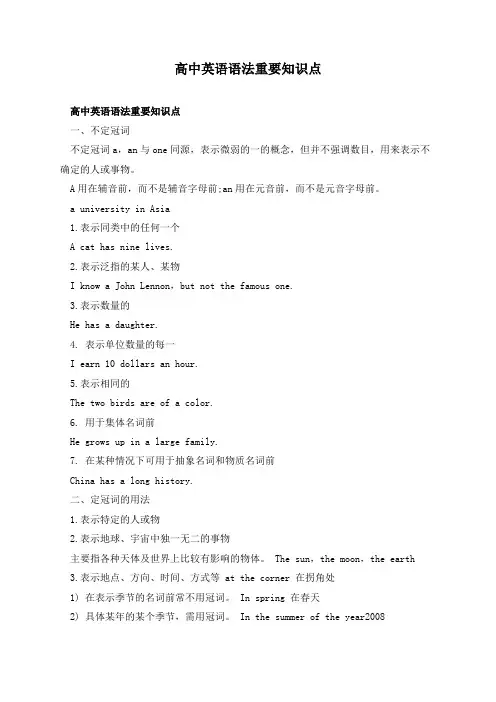
高中英语语法重要知识点高中英语语法重要知识点一、不定冠词不定冠词a,an与one同源,表示微弱的一的概念,但并不强调数目,用来表示不确定的人或事物。
A用在辅音前,而不是辅音字母前;an用在元音前,而不是元音字母前。
a university in Asia1.表示同类中的任何一个A cat has nine lives.2.表示泛指的某人、某物I know a John Lennon,but not the famous one.3.表示数量的He has a daughter.4. 表示单位数量的每一I earn 10 dollars an hour.5.表示相同的The two birds are of a color.6. 用于集体名词前He grows up in a large family.7. 在某种情况下可用于抽象名词和物质名词前China has a long history.二、定冠词的用法1.表示特定的人或物2.表示地球、宇宙中独一无二的事物主要指各种天体及世界上比较有影响的物体。
The sun,the moon,the earth 3.表示地点、方向、时间、方式等 at the corner 在拐角处1) 在表示季节的名词前常不用冠词。
In spring 在春天2) 具体某年的某个季节,需用冠词。
In the summer of the year20083)用于序数词或形容词的最高级前 the first the second4)用于形容词前使其名词化 the rich the poor5)用于复数姓氏前,表示―夫妇‖或全家 The Smiths6)用于乐器名词前 Play the piano7)用于by+the+计量单位名词 By the pound1. 用于复数名词前复数名词泛指某类人或物时,其前通常用零冠词。
Students should obey the school rules. 学生应该遵守校规。
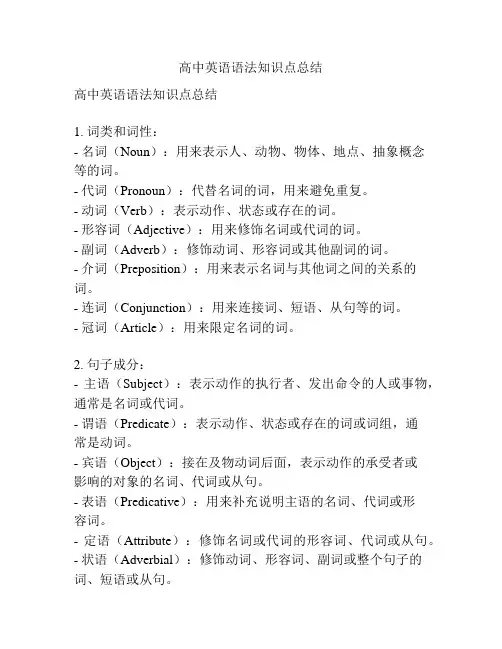
高中英语语法知识点总结高中英语语法知识点总结1. 词类和词性:- 名词(Noun):用来表示人、动物、物体、地点、抽象概念等的词。
- 代词(Pronoun):代替名词的词,用来避免重复。
- 动词(Verb):表示动作、状态或存在的词。
- 形容词(Adjective):用来修饰名词或代词的词。
- 副词(Adverb):修饰动词、形容词或其他副词的词。
- 介词(Preposition):用来表示名词与其他词之间的关系的词。
- 连词(Conjunction):用来连接词、短语、从句等的词。
- 冠词(Article):用来限定名词的词。
2. 句子成分:- 主语(Subject):表示动作的执行者、发出命令的人或事物,通常是名词或代词。
- 谓语(Predicate):表示动作、状态或存在的词或词组,通常是动词。
- 宾语(Object):接在及物动词后面,表示动作的承受者或影响的对象的名词、代词或从句。
- 表语(Predicative):用来补充说明主语的名词、代词或形容词。
- 定语(Attribute):修饰名词或代词的形容词、代词或从句。
- 状语(Adverbial):修饰动词、形容词、副词或整个句子的词、短语或从句。
3. 时态:- 一般现在时(Simple Present):表示经常或习惯性的动作。
- 现在进行时(Present Continuous):表示现在正在进行的动作。
- 一般过去时(Simple Past):表示过去发生的动作或存在的状态。
- 过去进行时(Past Continuous):表示过去某个时间点正在进行的动作。
- 一般将来时(Simple Future):表示将来要发生的动作或存在的状态。
- 将来进行时(Future Continuous):表示将来特定时间正在进行的动作。
4. 语态:- 被动语态(Passive Voice):强调动作的接受者,即主语是动作的承受者。
- 主动语态(Active Voice):强调动作的执行者,即主语是动作的执行者。
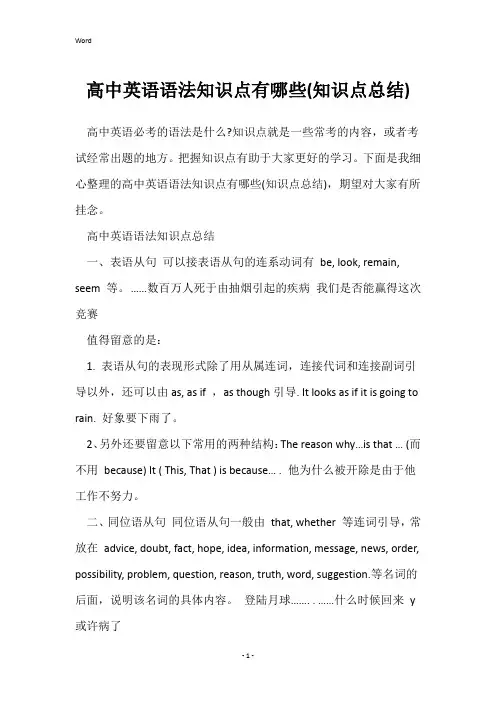
高中英语语法知识点有哪些(知识点总结)高中英语必考的语法是什么?知识点就是一些常考的内容,或者考试经常出题的地方。
把握知识点有助于大家更好的学习。
下面是我细心整理的高中英语语法知识点有哪些(知识点总结),期望对大家有所挂念。
高中英语语法知识点总结一、表语从句可以接表语从句的连系动词有be, look, remain, seem 等。
……数百万人死于由抽烟引起的疾病我们是否能赢得这次竞赛值得留意的是:1. 表语从句的表现形式除了用从属连词,连接代词和连接副词引导以外,还可以由as, as if ,as though引导. It looks as if it is going to rain. 好象要下雨了。
2、另外还要留意以下常用的两种结构:The reason why…is that … (而不用because) It ( This, That ) is because… . 他为什么被开除是由于他工作不努力。
二、同位语从句同位语从句一般由that, whether 等连词引导,常放在advice, doubt, fact, hope, idea, information, message, news, order, possibility, problem, question, reason, truth, word, suggestion.等名词的后面,说明该名词的具体内容。
登陆月球……. . ……什么时候回来y 或许病了三、宾语从句宾语从句可以作及物动词的宾语,介词的宾语,某些形容词的宾语以及非谓语动词的宾语。
1.及物动词后的宾语从句:a warm support……任何需要挂念的人…… 她为什么拒绝了我的邀请2.介词后的宾语从句:我总是在思考如何提高我的口语水平。
老师对他所说的话很满足。
3.某些形容词后的宾语从句:……通过努力工作,你将取得更大的进步…….他没有告辞就走了4.非谓语动词后的宾语从句:Realizing that it was just a difference in custom, the foreigner smiled and said nothing.高中英语语法知识重点1、主语主语表示句子主要说明的人或事物,一般由名词,代词,数词,不定式等充当。

英语语法知识点高中英语语法学问点高中第一篇过去完成过去如今留意:在含有时间状语从句的复合句中,若两个动作紧接着发生,则不需用过去完成时,尤其是在含有before和after的复合句中,常用一般过去时代替过去完成时。
2、表示未曾实现的期望、准备、意图、诺言等。
常用had hoped/ planned/ meant/ intended/ thought/ wanted/ expected等或用上述动词过去式接不定式表示即:hoped/ planned…+to do。
3、过去完成时用于hardly…when, no sooner…than等固定句型中。
十一、不能用被动语态的状况1、there be 结构及全部的不及物动词或词组充当谓语时,无被动语态。
2、系动词无被动语态。
3、一些表示状态的及物动词,如cost, have, own, possess等不能用被动语态。
4、表示“期望、意图〞的动词,如wish, want, hope, like, love,hate 等不能变被动语态。
5、当及物动词leave, enter, reach等的宾语是表示地点和处十二、主动形式表被动意义1、某些动词形式上主动,但含有被动意思,往往表示主语本身的性质,而且主语应当是事物。
2、在“have+宾语+to do〞结构中,当不定式的规律主语在句中出现时,不定式用主动语态,否则用被动语态。
3、在“be+形容词+to do〞中,不定式的规律宾语是句子的主语,用主动表被动。
4、在某些词组中,用动词的主动形式表被动。
(1)be worth doing(2)want, require, need后面的动名词用主动形式表示被动含义。
(3)with复合结构十三、被动形式表示主动意义的几种状况be seated(坐着),be hidden(隐藏),be lost(迷路),be drunk(喝醉),be dressed(穿着)过去完成过去如今留意:在含有时间状语从句的复合句中,若两个动作紧接着发生,则不需用过去完成时,尤其是在含有before和after的复合句中,常用一般过去时代替过去完成时。
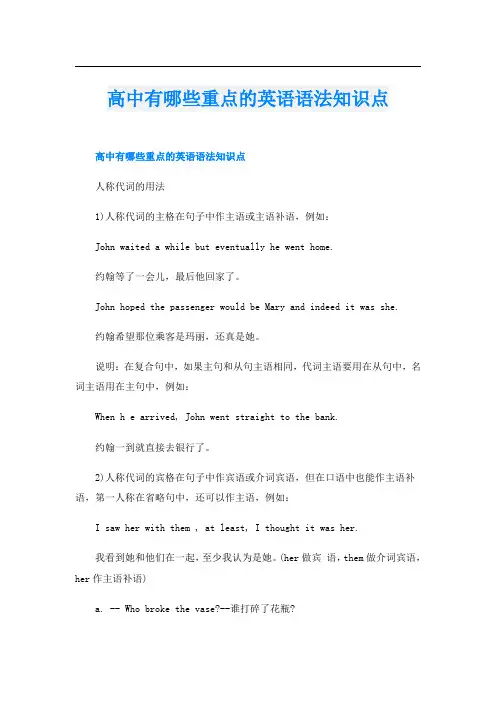
高中有哪些重点的英语语法知识点高中有哪些重点的英语语法知识点人称代词的用法1)人称代词的主格在句子中作主语或主语补语,例如:John waited a while but eventually he went home.约翰等了一会儿,最后他回家了。
John hoped the passenger would be Mary and indeed it was she.约翰希望那位乘客是玛丽,还真是她。
说明:在复合句中,如果主句和从句主语相同,代词主语要用在从句中,名词主语用在主句中,例如:When h e arrived, John went straight to the bank.约翰一到就直接去银行了。
2)人称代词的宾格在句子中作宾语或介词宾语,但在口语中也能作主语补语,第一人称在省略句中,还可以作主语,例如:I saw her with them , at least, I thought it was her.我看到她和他们在一起,至少我认为是她。
(her做宾语,them做介词宾语,her作主语补语)a. -- Who broke the vase?--谁打碎了花瓶?b. -- Me .--我。
(me作主语补语= Its me.)说明:在上面两例句中,her和me分别作主语补语。
现代英语中多用宾格,在正式文体中这里应为she和I。
人称代词之主、宾格的替换1) 宾格代替主格a.在简短对话中,当人称代词单独使用或在not 后,多用宾语。
---- I like English.--我喜欢英语。
---- Me too.--我也喜欢。
---- Have more wine?--再来点酒喝吗?---- Not me.--我可不要了。
b.在表示比较的非正式的文体中,常用宾格代替主格。
但如果比较状语的谓语保留,则主语只能用主格。
He is taller than I/me.He is taller than I am.2) 主格代替宾格a. 在介词but,except 后,有时可用主格代替宾格。
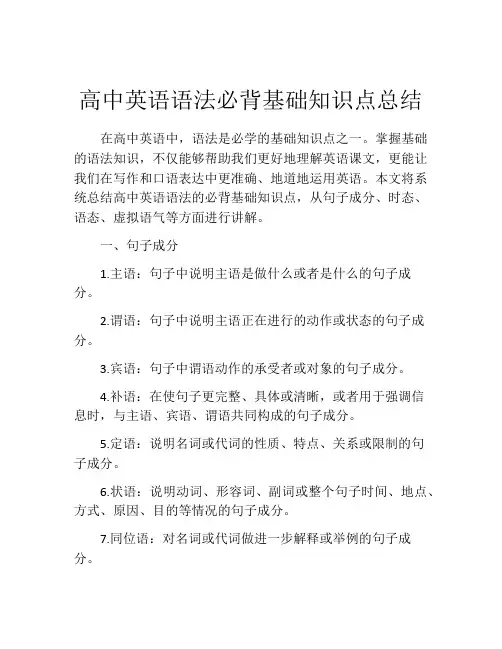
高中英语语法必背基础知识点总结在高中英语中,语法是必学的基础知识点之一。
掌握基础的语法知识,不仅能够帮助我们更好地理解英语课文,更能让我们在写作和口语表达中更准确、地道地运用英语。
本文将系统总结高中英语语法的必背基础知识点,从句子成分、时态、语态、虚拟语气等方面进行讲解。
一、句子成分1.主语:句子中说明主语是做什么或者是什么的句子成分。
2.谓语:句子中说明主语正在进行的动作或状态的句子成分。
3.宾语:句子中谓语动作的承受者或对象的句子成分。
4.补语:在使句子更完整、具体或清晰,或者用于强调信息时,与主语、宾语、谓语共同构成的句子成分。
5.定语:说明名词或代词的性质、特点、关系或限制的句子成分。
6.状语:说明动词、形容词、副词或整个句子时间、地点、方式、原因、目的等情况的句子成分。
7.同位语:对名词或代词做进一步解释或举例的句子成分。
8.插入语:用以强调某一句子成分或区分语气的句子成分。
二、时态时态是英语语法中的重要部分,是指一种动词变形形式,用来表示动作所发生的时间。
下面是高中英语中需要掌握的时态形式:1.现在时:表示正在进行的动作,或者表示客观真理、习惯性动作。
2.过去时:表示在过去完成或正在进行的动作。
3.将来时:表示将会发生的动作。
4.现在完成时:表示正在进行或刚刚完成的动作对现在造成的影响或结果。
5.过去完成时:表示在过去某个时间点前已经完成的动作。
6.将来完成时:表示将在某个时间点之前完成的动作。
7.过去进行时:表示过去某一时刻正在进行的动作。
8.现在进行时:表示现在正在进行的动作。
9.将来进行时:表示将来某个时间点正在进行的动作。
三、语态语态是指动词表示的“动作发生的意义”与“该动作与主语的关系”所产生的特殊形式。
英语中的语态主要分为:主动语态(the active voice)和被动语态(the passive voice)。
在高中英语中,我们需要掌握正确使用主动语态和被动语态的方法和规则,以便更好地理解和表达英语句子。
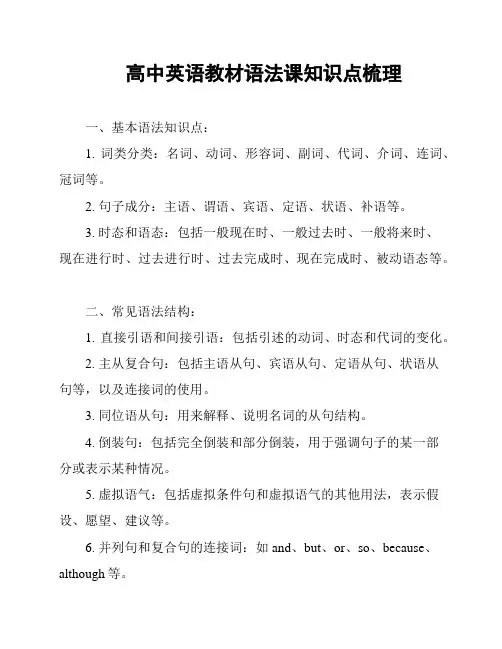
高中英语教材语法课知识点梳理
一、基本语法知识点:
1. 词类分类:名词、动词、形容词、副词、代词、介词、连词、冠词等。
2. 句子成分:主语、谓语、宾语、定语、状语、补语等。
3. 时态和语态:包括一般现在时、一般过去时、一般将来时、
现在进行时、过去进行时、过去完成时、现在完成时、被动语态等。
二、常见语法结构:
1. 直接引语和间接引语:包括引述的动词、时态和代词的变化。
2. 主从复合句:包括主语从句、宾语从句、定语从句、状语从
句等,以及连接词的使用。
3. 同位语从句:用来解释、说明名词的从句结构。
4. 倒装句:包括完全倒装和部分倒装,用于强调句子的某一部
分或表示某种情况。
5. 虚拟语气:包括虚拟条件句和虚拟语气的其他用法,表示假设、愿望、建议等。
6. 并列句和复合句的连接词:如and、but、or、so、because、although等。
三、常见错误和注意事项:
1. 主谓一致:要注意主语和谓语动词的语法一致性。
2. 形容词和副词的比较级和最高级:要注意不同形式的比较级和最高级的用法。
3. 冠词的用法:要注意不同情况下a、an和the的正确使用。
4. 介词的用法:要注意介词和动词、名词、形容词等的搭配。
5. 动词时态和语态:要注意时态和语态的正确使用,以及与其他词性的一致性。
综上所述,高中英语教材语法课的知识点主要包括基本语法知识、常见语法结构以及常见错误和注意事项。
通过系统学习这些知识点,学生能够提高对英语语法的理解和应用能力。
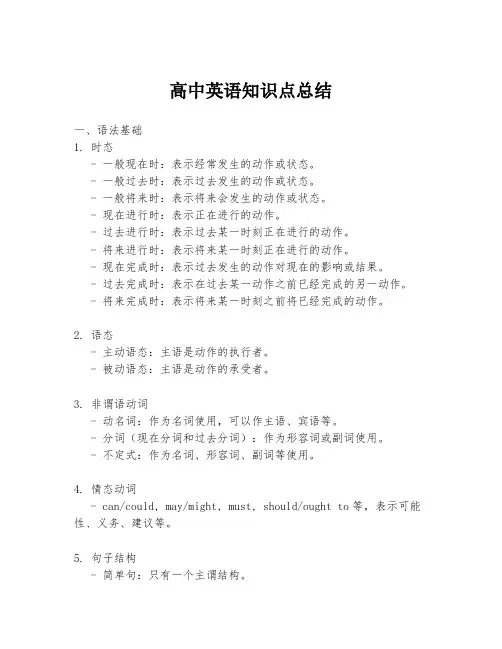
高中英语知识点总结一、语法基础1. 时态- 一般现在时:表示经常发生的动作或状态。
- 一般过去时:表示过去发生的动作或状态。
- 一般将来时:表示将来会发生的动作或状态。
- 现在进行时:表示正在进行的动作。
- 过去进行时:表示过去某一时刻正在进行的动作。
- 将来进行时:表示将来某一时刻正在进行的动作。
- 现在完成时:表示过去发生的动作对现在的影响或结果。
- 过去完成时:表示在过去某一动作之前已经完成的另一动作。
- 将来完成时:表示将来某一时刻之前将已经完成的动作。
2. 语态- 主动语态:主语是动作的执行者。
- 被动语态:主语是动作的承受者。
3. 非谓语动词- 动名词:作为名词使用,可以作主语、宾语等。
- 分词(现在分词和过去分词):作为形容词或副词使用。
- 不定式:作为名词、形容词、副词等使用。
4. 情态动词- can/could, may/might, must, should/ought to等,表示可能性、义务、建议等。
5. 句子结构- 简单句:只有一个主谓结构。
- 并列句:由两个或多个简单句通过并列连词连接。
- 复合句:包含一个主句和至少一个从句。
- 复杂句:包含一个主句和多个从句,至少有一个从句是嵌套的。
二、词汇与短语1. 基础词汇- 常用名词、动词、形容词、副词、代词等。
- 同义词、反义词、短语动词等。
2. 词组和习语- 常见短语动词:look after, take care of, give up等。
- 习语和俚语:break the ice, bite the bullet, hit the sack 等。
三、阅读理解1. 阅读技巧- 略读(skimming):快速获取文章大意。
- 扫读(scanning):寻找具体信息。
- 精读(intensive reading):深入理解文章内容。
2. 文章类型- 记叙文、议论文、说明文、应用文等。
3. 阅读理解策略- 预测:根据上下文预测内容。
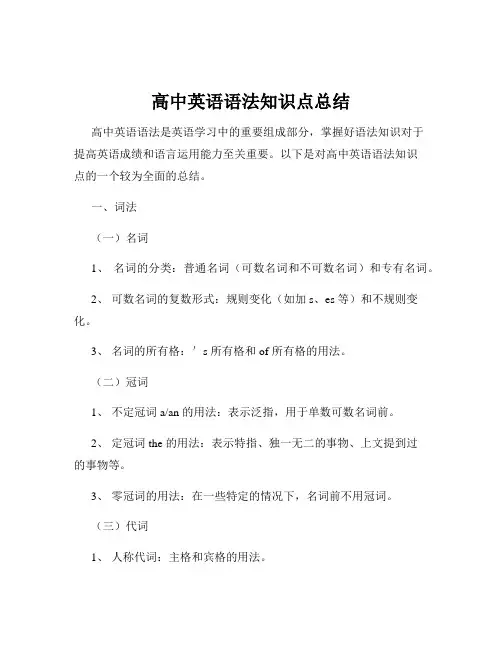
高中英语语法知识点总结高中英语语法是英语学习中的重要组成部分,掌握好语法知识对于提高英语成绩和语言运用能力至关重要。
以下是对高中英语语法知识点的一个较为全面的总结。
一、词法(一)名词1、名词的分类:普通名词(可数名词和不可数名词)和专有名词。
2、可数名词的复数形式:规则变化(如加 s、es 等)和不规则变化。
3、名词的所有格:'s 所有格和 of 所有格的用法。
(二)冠词1、不定冠词 a/an 的用法:表示泛指,用于单数可数名词前。
2、定冠词 the 的用法:表示特指、独一无二的事物、上文提到过的事物等。
3、零冠词的用法:在一些特定的情况下,名词前不用冠词。
(三)代词1、人称代词:主格和宾格的用法。
2、物主代词:形容词性物主代词和名词性物主代词的用法。
3、指示代词:this, that, these, those 的用法。
4、不定代词:some, any, no, none, all, both, neither, either, many, much, few, a few, little, a little 等的用法。
(四)数词1、基数词和序数词的构成和用法。
2、分数、小数、百分数的表达。
(五)形容词和副词1、形容词的用法:在句中作定语、表语、宾语补足语等。
2、副词的用法:在句中作状语,修饰动词、形容词、副词或整个句子。
3、形容词和副词的比较级和最高级:规则变化和不规则变化,以及比较级和最高级的用法。
(六)动词1、动词的时态:一般现在时、一般过去时、一般将来时、现在进行时、过去进行时、将来进行时、现在完成时、过去完成时、将来完成时、现在完成进行时。
2、动词的语态:主动语态和被动语态的构成和用法。
3、非谓语动词:动词不定式、动名词、分词(现在分词和过去分词)的用法。
(七)介词1、常用介词的用法:如 at, in, on, for, of, with, by, from, to 等。
2、介词短语的用法。
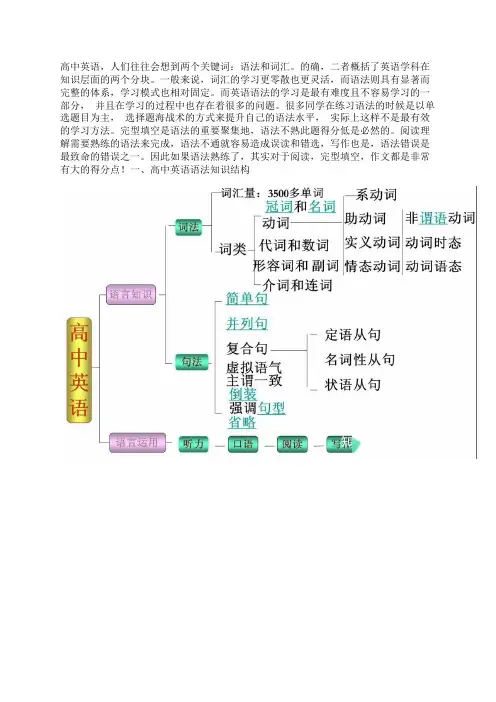
高中英语,人们往往会想到两个关键词:语法和词汇。
的确,二者概括了英语学科在知识层面的两个分块。
一般来说,词汇的学习更零散也更灵活,而语法则具有显著而完整的体系,学习模式也相对固定。
而英语语法的学习是最有难度且不容易学习的一部分,并且在学习的过程中也存在着很多的问题。
很多同学在练习语法的时候是以单选题目为主,选择题海战术的方式来提升自己的语法水平,实际上这样不是最有效的学习方法。
完型填空是语法的重要聚集地,语法不熟此题得分低是必然的。
阅读理解需要熟练的语法来完成,语法不通就容易造成误读和错选,写作也是,语法错误是最致命的错误之一。
因此如果语法熟练了,其实对于阅读,完型填空,作文都是非常有大的得分点!一、高中英语语法知识结构
二、高中英语语法知识表格。

高中英语语法知识点总结一、名词名词是指人、事物、地方、感情等的名称,分为普通名词和专有名词。
1.名词的复数形式普通名词的复数形式通常是在词尾加-s,如:books,pens。
还有些名词复数形式有特殊变化,如:child-children,man-men。
也有一些名词没有复数形式,如:milk、money等。
2.名词的所有格名词所有格的构成方式是名词后加‘’s”,如:Tom’s book,the girl’s mother。
但是如果名词是复数形式,则只需在词尾加-’,如:the girls’ books。
3.不可数名词不可数名词是指不能用复数形式的名词,如:water,milk,information。
在使用不可数名词时不可用a/an修饰,通常使用some,any,much,little等来修饰,如:some water, any information等。
二、代词代词是指代名词的词语。
代词分为人称代词、物主代词、指示代词、疑问代词、不定代词等。
1.人称代词人称代词分为主格和宾格。
主格一般用来作句子的主语,宾格一般用来作句子的宾语。
如:I am a student. Do you like her?2.物主代词物主代词用来表示所有关系。
如:my, your, his, her, its, our, their等。
3.指示代词指示代词用来表示离说话人或听话人近或远的事物。
如:this, that, these, those。
4.疑问代词疑问代词用来提问,如:who, whom, whose, which, what。
5.不定代词不定代词用来泛指某一个或任意一个,如:some, any, something, anything, everybody, nobody等。
三、动词动词是表示动作或状态的词语。
动词有时态、语态和语气的变化。
动词的时态表达动作发生的时间,如:一般现在时,一般过去时,过去将来时等。
高中英语语法知识点总结(实用版)编制人:__________________审核人:__________________审批人:__________________编制单位:__________________编制时间:____年____月____日序言下载提示:该文档是本店铺精心编制而成的,希望大家下载后,能够帮助大家解决实际问题。
文档下载后可定制修改,请根据实际需要进行调整和使用,谢谢!并且,本店铺为大家提供各种类型的实用范文,如工作计划、工作总结、演讲稿、合同范本、心得体会、条据文书、应急预案、教学资料、作文大全、其他范文等等,想了解不同范文格式和写法,敬请关注!Download tips: This document is carefully compiled by this editor. I hope that after you download it, it can help you solve practical problems. The document can be customized and modified after downloading, please adjust and use it according to actual needs, thank you!Moreover, our store provides various types of practical sample essays for everyone, such as work plans, work summaries, speech drafts, contract templates, personal experiences, policy documents, emergency plans, teaching materials, complete essays, and other sample essays. If you want to learn about different formats and writing methods of sample essays, please stay tuned!高中英语语法知识点总结高中英语语法知识点总结(精选5篇)高中英语语法知识点总结篇11、词类:英语词类分十种:名词、形容词、代词、数词、冠词、动词、副词、介词、连词、感叹词。
高中英语语法知识点归纳总结高中英语语法知识点归纳总结一、基础语法知识点1. 词性和词类:名词、代词、形容词、动词、副词、介词、连词、冠词等。
2. 句子成分:主语、谓语、宾语、定语、状语、补语等。
3. 语态:主动语态和被动语态。
4. 时态:一般现在时、一般过去时、一般将来时、现在进行时、过去进行时、过去将来时、现在完成时、过去完成时等。
5. 特殊句型:倒装句、虚拟语气、直接引语和间接引语、条件句等。
二、名词1. 可数名词和不可数名词2. 单数名词和复数名词的形式变化3. 名词所有格的用法三、代词1. 人称代词、物主代词、反身代词、指示代词、不定代词等2. 代词的宾格和主格形式的区别3. 一些特殊的代词用法,如every, each, either, neither 等四、形容词和副词1. 形容词的基本用法,用于修饰名词2. 副词的基本用法,用于修饰动词、形容词和其他副词3. 形容词和副词的比较级和最高级形式变化规则4. 有些形容词和副词的特殊用法,如good, well, bad, badly等五、动词1. 动词的基本用法,表示动作或状态2. 动词的时态和语态的变化3. 动词的不同形式:基本形、过去式、过去分词、现在分词等4. 动词的时态和动词短语的用法六、时态和语态1. 一般现在时2. 一般过去时3. 一般将来时4. 现在进行时5. 过去进行时6. 现在完成时7. 过去完成时8. 被动语态的构成和用法七、介词和介词短语1. 常见的介词和介词短语的用法2. 介词的时间、地点、方式、原因等用法八、连词1. 并列连词的用法,如and, or, but等2. 从属连词的用法,如because, if, when等九、冠词1. 定冠词和不定冠词的用法2. 前置冠词和后置冠词的用法十、句子结构和句型1. 主谓结构2. 主谓宾结构3. 主谓宾定结构4. 主系表结构5. 其他常见的句型,如感叹句、倒装句、祈使句等十一、其他语法知识点1. 形容词和副词的用法区别2. 名词的单复数规则3. 不定代词的用法4. 状语从句的用法5. 定语从句的用法6. 强调句的结构7. 虚拟语气的用法8. 间接引语的转换等以上是高中英语语法的基础知识点的归纳总结,希望能对你有所帮助。
高中英语语法大全知识点读书能获得知识;但更有用的知识对世界的认识却只能通过研究各种各样的人才能获得。
下面小编给大家分享一些高中英语语法大全知识,希望能够帮助大家,欢迎阅读!高中英语语法大全1简单句、并列句、复合句1. 简单句句型:主语+谓语只包含一个主谓结构,而句子的各个结构都只由单词或短语表示。
2. 并列句句型:简单句+并列连词(或连接副词)+简单句由两个或两个以上的简单句并列连接起来的句子叫并列句。
并列句中的各简单句意义同等重要,相互之间没有从属关系,是平行并列的关系。
它们之间用连词连结。
1、联合关系:常用的连词有and, not only…but(also), neither…nor等。
Eg. Tom doesn’t smoke, nor does his brother.2、转折关系常用的连词有but, yet, still, however, while(而,然而),when(那时,然后)等。
Eg. He got up very early, (and) yet he failed to catch the morning train.We played outside till sunset, when it began to rain.She is tired, (but) still she will make another test.yet 和still是连接副词,又叫半连接句。
however(然而,不过,但是)意义接近yet,可放在句首、句末或插入句子中间。
3、选择关系:常用的连词有or(或者,还是,否则),otherwise, or else,either…or等。
Eg. Hurry up, or we’ll be late for school.4、因果关系连词有:for, so, thus, therefore, and so 等。
Eg. He studied hard, thus he succeeded in passing the exam.The Frenchman coughed loudly, so he decided to go and get some medicine for it.for 表示附加或推断的理由、原因。
高中英语-语法规则知识点汇总1. 时态- 现在时:表现当前或经常发生的动作或状态。
- 过去时:表示已经过去的动作或状态。
- 将来时:表示将要发生的动作或状态。
- 进行时:表示正在进行的动作或状态。
2. 名词- 可数名词:可以单独存在,可以用来表示数量。
- 不可数名词:不能单独存在,不能用来表示数量。
- 可数名词的复数形式:通常在词尾加-s 或-es。
- 不可数名词的量词:使用部分量词来表示数量。
3. 代词- 主格代词:作为主语出现或作为表语。
- 宾格代词:作为动词的宾语或介词的宾语。
- 形容词性物主代词:表示所有关系。
- 名词性物主代词:直接代替名词。
- 反身代词:指代与主语一致的人或物。
- 不定代词:不指代特定人或物,如somebody, everybody等。
4. 形容词- 描述名词的特征或性质。
- 通常位于名词之前。
- 可以使用比较级和最高级来表示程度。
- 形容词有三种形式:原级、比较级、最高级。
5. 副词- 修改动词、形容词、副词或整个句子。
- 副词可以形容时间、地点、频率、方式等。
- 副词通常位于动词之前。
6. 动词- 表示动作、情态、状态或存在。
- 规则动词的时态变化:过去式和过去分词形式通常在词尾加-ed。
- 不规则动词的时态变化:过去式和过去分词形式不能按规则加-ed,需要具体记忆。
7. 介词- 连接名词或代词与其他词之间的关系。
- 常见的介词有in, on, at, for, to, with等。
8. 从句- 从属于主句的句子,不能单独存在。
- 分为名词从句、定语从句、状语从句和宾语从句。
9. 并列句- 由两个或多个相同类型的句子通过连词连接而成。
- 常见的连词有and, but, or, so等。
10. 定语从句- 用来修饰名词或代词的从句。
- 通常由关系代词或关系副词引导。
以上是高中英语语法规则的知识点汇总,希望对你有所帮助!。
高中英语语法总结第一章主谓一致(一) 语法一致原则: 即主语为单数,谓语用单数,主语为复数,谓语也用复数. 以下为注意事项:1. 单数主语即使后面带有with , along with, together with, like(像), but (除了),except, besides, as well as, no less than, rather than(而不是), including, in addition to 引导的短语, 谓语动词仍用单数.如: Air as well as water is matter. 空气和水都是物质.No one except two servants was late for the dinner. 除了两个仆人外, 没有一个人迟来用餐。
2. 用and连接的并列主语,如果主语是同一个人,同一事,同一概念, 谓语动词用单数, 否则用复数. 如:The poet and writer has come. 那位诗人兼作家来了.(一个人)A hammer and a saw are useful tools. 锤子和锯都是有用的工具. (两样物)用and连接的成对名词习惯上被看成是一个整体, 如:bread and butter(黄油抹面包), knife and fork(刀叉)等作主语时, 谓语动词用单数。
3. 不定式(短语), 动名词(短语), 或从句作主语时, 谓语动词用单数. 如:Serving the people is my great happiness.为人民服务是我最大的幸福.When we’l l go out for an outing has been decided.我们什么时候出去郊游已决定了。
4. 用连接的并列主语被each, every 或no修饰时, 谓语动词用单数.Every boy and every girl likes to go swimming. 每个男孩和每个女孩都喜欢去游泳.No teacher and no student was absent from the meeting. 没有老师也没有学生开会缺席.Each man and (each) woman is asked to help. 每个男人和每个女人都被请去帮忙。
高中英语语法知识点总结归纳大全在学习英语的过程中,掌握语法知识是非常重要的。
良好的语法基础能够帮助我们准确理解和表达英语,提高英语写作和口语能力。
本文将对高中英语语法知识点进行总结和归纳,帮助大家更好地理解和应用这些知识。
一、名词 (Noun)名词是指表示人、动物、事物、概念等的名称。
在句子中,名词通常用来作为主语、宾语、表语、定语和同位语。
根据其性质可分为可数名词和不可数名词。
可数名词可以单独使用或者加上数量词表示个体;不可数名词表示不可分割的抽象概念,通常没有复数形式。
二、代词 (Pronoun)代词用来代替名词并在句子中起到相同的作用。
常见的代词有人称代词、物主代词、反身代词、指示代词、不定代词等。
代词的正确使用能够避免重复使用名词,减少冗余。
三、动词 (Verb)动词是句子的核心,表示行为或状态。
根据动词的形式可以分为实义动词和系动词。
实义动词可以表示具体的动作或状态,而系动词用来连接主语和表语。
动词的时态和语态也是需要注意的重点。
四、形容词 (Adjective)形容词用来描述名词的性质、状态或特征。
通常形容词在句子中作为定语或表语使用。
形容词的比较级和最高级形式可以用来对比不同事物之间的差异。
五、副词 (Adverb)副词用来修饰动词、形容词、其他副词或整个句子。
副词可以对动词进行修饰,表示时间、地点、程度、方式等。
副词的使用能够使句子更具表达力和准确性。
六、介词 (Preposition)介词用来表示名词和其他词之间的关系,常常用来表示时间、地点、方式、原因等。
介词通常位于名词或代词之前,构成介词短语。
七、连词 (Conjunction)连词主要用来连接词语、短语、从句和句子。
常见的连词有并列连词、递进连词、转折连词、因果连词等。
运用恰当的连词能够使句子更加连贯和清晰。
八、冠词 (Article)冠词是一种特殊的限定词,包括定冠词和不定冠词。
定冠词"The"用来特指一个或已知的人或事物,不定冠词"A/An"用来表示泛指。
完成时语法专项一实际意义现在完成时表示的是在过去某个时间开始并持续到现在的_____/______,或者过去的动作或状态对现在造成的______或_________。
1)现在完成时的"完成用法"现在完成时用来表示现在之前已发生过或完成的动作或状态,但其结果却和现在有联系,也就是说,动作或状态发生在过去但它的影响现在还存在.He has turned off the light.他已把灯关了。
(动作结束于过去,但说明的是现在的情况--灯现在不亮了。
)I have spent all of my money.(含义是:现在我没有钱花了.)Jane has laid the table.(含义是:现在桌子已经摆好了.)2)现在完成时的"未完成用法"指的是动作开始于过去某一时刻,一直延续到现在,或可能还要继续下去。
★这里主句的动词要用持续性动词。
常与for(+时间段),since(+时间点)since+ 一般过去时的句子连用. for(+时间段)= since(+时间点)★如果主句的动词不是持续性动词,要转化为持续性动词,才能和表示一段时间的状语”连用。
Mary has been ill for three days. (我病了,还可能要病几天.) =Mary has been ill since three days ago.二、现在完成时的结构1)肯定式:主语+ have / has + 过去分词2)否定式: 主语+ have / has + not + 过去分词3)一般疑问式Have / Has + 主语+ 过去分词4)特殊疑问式特殊疑问词+have/has+主语+过去分词三、现在完成时的时间状语现在完成时的标志词1.already(已经)2.just(刚刚,正好)3.ever(曾经)4.never(从来,也不;从不)5.yet(仍然)等连用。
6.for +时间段7.since +过去时间点”since+一般过去时的句子“It is + 一段时间+since一般过去时从句8. recently(近来)9.so far(到目前为止),10.in the past/“last + 一段时间”11. once(一次)12.twice(两次)13.three times(三次14.several times(几次)★练习:用since和for填空1) ______ two years 2) _______ two years ago 3) _______ last month4) ______ 1999 5) _______ yesterday 6) _______ 4 o’clock7) ______ 4 hours 8) _______ an hour ago9) _______ we were children 10) _____ lunch time 11) ____ she left here1. He has lived in Nanjing ________ the year before last.2. I’ve known him __________ we were children.3. Our teacher has studied Japanese _________ three years.4. She has been away from the city ___________ about ten years.5. It’s about ten years __________ she left the city.四、现在完成时态中already, yet, just, never, ever用法区别1、already意思是“已经”①通常用于陈述句中(放在have和has的后面)②也可用于疑问句,表示期望得到肯定的回答或表示惊异,此时already常放在句末。
She has already found her bike.Has she found her bike already?她已经找到自行车了?2、yet用法①yet可用于否定句,此时译为“还”;I haven’t found my ruler yet.②也可以用于疑问句,译为“已经”(放在have和has的后面也可放在句末)Have you found your ruler yet?你已经找到尺子了吗?3、just只用于陈述句意思是“刚才”(放在have和has的后面)I have just received a letter.4、never用于否定句译为“从不”(放在have和has的后面)I’ve never been to Beijing.5、ever用于疑问句译为“曾经”(放在have和has的后面)Have you ever been to Beijing?★五、英语的行为动词有持续性动词和瞬间性动词之分,使用中应注意两者的区别。
1、持续性动词: 表示一个动作可以持续一段时间或更长时间。
常见的study, play, do, read, learn, drive, write, clean , sleep, speak, talk, wait, fly, stay, sit, stand, lie, keep等。
2、瞬间性动词: 表示一个动作发生在一瞬间,非常短暂。
亦称终止性动词。
常见的--begin, start, finish, go, come, leave, find, get up, arrive, reach, get to, enter, hear, stop, open, close, become, buy, borrow, lend, happen, join, lose, renew, die, take away, put up, set out, put on, get on/off等瞬间性动词在完成时中如要与表示持续一段时间的状语连用,通常有两种方法:(1)用意思相当的持续性动词来替换He has been in the army/a soldier for three years. (他参军已有3年了。
)不用has joinedShe has been up for quite some time.(她起床已有好久了。
)不用has got upHas your brother been away from home for a long time?(离家已有好久了吗?)不用has left常用瞬间动词相应持续性动词关系:1、go—be away2、come—be here3、come back—be back4、leave—be away(be not here)5、buy—have6、borrow—keep7、die——be dead8、begin——be on9、finish—be over 10、open——be open 11、close——be closed 12、lose——be lost 13、get to know—know 14、turn on—be on 15、get up——be up 16、sit down—sit/be seated17、join—be in(…)或be a…member 18、become—be【练习】:延续性动词和瞬间性动词之间的转化1. He died 10 years ago.--- He ____ ____ ____ for 10 years / since 10 years ago.2. He borrowed the book 2 weeks ago. --- He ____ ____ the book for 2 weeks.3. He bought the motorbike a month ago.---He ____ ____ the motorbike for a month.4. He arrived here three days ago.--- He ____ ____ here since three days ago.5. They turned off the light 2 hours ago.--- The light ____ ____ ____ for 2 hours.6. He left here 2 years ago. --- He ____ ____ ____ from here for 2 years.7. The film began 30 minutes ago.--- The film ____ ____ ____ for 30 minutes.8. They opened the door an hour ago.--- The door ____ ____ ____ for an hour.9. They closed the door an hour ago.--- The door ____ ____ ____ for an hour.10. He joined the army last year. --- He ____ ____ a ____ for a year.--- He ____ ____ ____ the army for a year.六、1. have/has gone to 、have/has been to 和have/has been in的区别。
have/ has gone to 去了,在去某地的路上或在某地,人还未回来have/ has been to 曾经去过,人已经回来了have/ has been in 已经在,常与一段时间连用He has been to Shenyang before. 他以前曾去过沈阳。
He has been in Shenyang for ten years. 他在沈阳10年了。
Has he gone to Shenyang? 他去沈阳了吗?练习:认真琢磨,细心选择(体会现在完成时和一般过去时的区别)。
1. Where _____ you _____, John? I’m looking for you everywhere.A. have; beenB. have ;been toC. have; goneD. did; go to2. How long _____ your father _____ Shanghai?A. did; comeB. has; go toC. has; been toD. has; been in3. I _____ my watch in my bedroom yesterday.A. leftB. forgotC. have forgottenD. have left4. She has worked in the factory _____.A. since three years agoB. for 1999C. since in 1999D.since three years8、过去完成时过去完成时的动作须在过去某一时间之前发生,即发生在“过去的过去”。